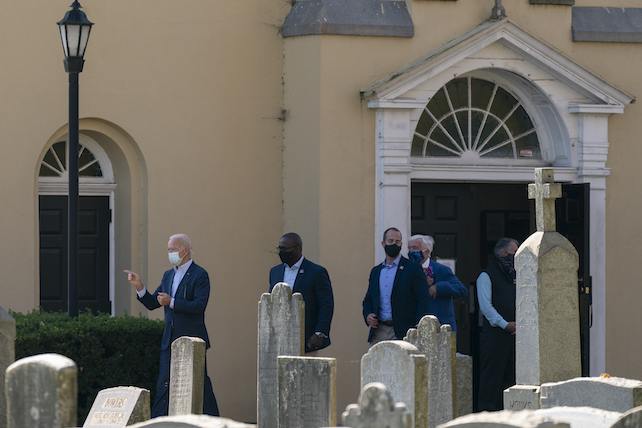(RNS) — President-elect Joe Biden says Americans should be allowed to worship in person “safely” during the ongoing pandemic. But as cases of COVID-19 spike in the U.S. just weeks before major religious holidays, questions abound as to whether attending religious services in person can, in fact, be safe — and if Biden’s approach to the contentious issue will differ from that of the Trump administration.
Biden, a Catholic, voiced his support for in-person worship on Saturday (Nov. 21) as he left Mass at St. Joseph on the Brandywine in Greenville, Delaware. When asked by a reporter whether Americans should be able to attend religious services despite the ongoing pandemic caused by the novel coronavirus, the president-elect responded, “Yes, safely.”
The former vice president, who has attended in-person Mass regularly throughout the pandemic, did not detail what “safe” worship looks like. And so far, his staff isn’t offering any clues: Neither his transition team nor members of his COVID-19 task force responded to repeated requests for comment on this story.
Restrictions on worship in the U.S. have thus far been managed through dialogues between faith groups and local governments, and Delaware is no exception: The state recently updated its guidance for indoor gatherings — including religious services — restricting events in buildings to 30 percent capacity with a maximum cap of 50 people. Meanwhile, the Diocese of Wilmington, which oversees St. Joseph and encompasses all of Delaware, has directed churches under its purview to abide by the recommendations of state and local authorities.
In addition, the diocese requires worship participants to remain 6 feet from each other and wear masks, and discourages people with symptoms and vulnerable populations from attending. St. Joseph also lists extensive sanitation practices on its website, and a representative for the diocese explained that Communion in the region is performed without wine and under strict guidelines — including repetitive sanitation of the priest’s hands during distribution of the host.
“A lot of our parishes will have pews roped off or blocked off to facilitate social distancing,” the spokesperson said.
The debate over how — or even if — to worship in person during the pandemic has raged since states first began implementing measures to stop the spread of COVID-19 in March. Some religious groups were quick to suspend services altogether, choosing instead to worship online. The Unitarian Universalist Association has recommended all its member congregations cancel in-person services until May 2021.
But others have been less willing to halt or limit physical gatherings, decisions that have put them in conflict with local authorities. While most governors and local officials have granted religious groups at least partial exemptions from orders limiting the size of in-person gatherings, others have cracked down on houses of worship that disregard health protocols.
On Sept. 10, a Los Angeles Superior Court judge granted a preliminary injunction against pastor John MacArthur’s Grace Community Church, prohibiting it from holding indoor worship services, though it has continued to do so. At least two evangelical Christian pastors in Florida and Louisiana have been arrested this year for openly flouting local regulations, and police in New York City sparked controversy for repeatedly breaking up large Orthodox Jewish gatherings.
Evangelical Christian musician Sean Feucht hosted a series of concerts — some without permits — in cities across the country as part of his “Let Us Worship” tour, where large crowds packed together and sang loudly, many without masks.
Trump took up the cause of those demanding worship in May, when he declared houses of worship “essential services” in an attempt to pressure state governors into allowing faith groups to worship.

